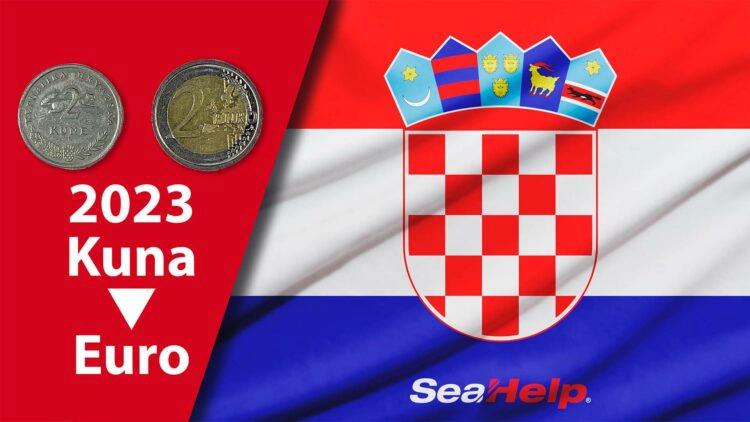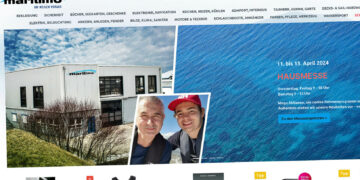The introduction of the euro in Croatia in place of the previous currency kuna on 1.1.2023 has long been a done deal, only in the summer of 2022 it requires the formal confirmation by the competent Commission of the European Union. What this step for the state of Croatia, the Croatian administration but also for the tourists who visit this country ultimately means and what consequences this step entails, is already highlighted in detail at this point. The information comes from the first hand, namely from the Permanent Mission of Croatia to the European Union, which is significantly involved in the preparation of the measures associated with the introduction of the euro.
Euro to kuna exchange rate in Croatia fixed
The expected exchange rate is 7.53450 Croatian kuna for one euro as of the reporting date.
Mammoth task for administration
In the process, the Croatian administration faces a truly Herculean task in terms of the successive withdrawal of kuna coins alone: Croatia minted a total of 2.8 billion kuna coins since the introduction of the kuna on May 30, 1994, as the successor currency to the Croatian dinar. A total of approximately 10,000 tons of kuna coins left the mints and must now be replaced by euro coins. The situation is similar with banknotes. So, before a shitstorm of the usual perma-empathy arises in the social media if something ever fails, those should remember the scope of the task and the currency introduction in their own country.
Double pricing euro and kuna
Important for all holidaymakers in a nutshell: Five months before the introduction of the euro in Croatia and one year after the introduction in Croatia, all prices must be marked twice, that is, in kuna and euro. Whoever uses the euro introduction to unjustified price increases, comes on a so-called “black list”, which will be publicly available.
Euro and kuna for two weeks means of payment
The introduction of the euro in Croatia on Jan. 1, 2023, will mark the beginning of a two-week period during which both the kuna and the euro will be official means of payment, after which only the euro will be recognized as a means of payment. Kuna banknotes will be exchanged for euros by the Croatian National Bank for an indefinite period, and coins can be exchanged up to three years after euro introduction.
Euro adoption Croatia: EU facts
To get all the details on Croatia’s upcoming euro adoption in more detail firsthand, SeaHelp editors asked Croatia’s Permanent Representation to the European Union directly. Here is the detailed response from Croatian spokesperson Morena Žagar:
Pricing Croatia in Euros and Kuna
There will be dual pricing as an important measure to protect consumers when the euro is introduced. The dual pricing requirement will apply for a period of approximately five months before and one year after the introduction of the euro. Businesses must display the dual display on price lists and in promotional materials published on websites and in the media.
Company cash registers will also be converted to dual pricing, so that the prices of individual products and the total amount of invoices will be displayed in both currencies. During the period of dual pricing, price lists must not contain unnecessary information that could confuse consumers. For example, in addition to the price in kuna and euro, the labels in the stores must contain only a fixed conversion rate (complete, i.e. with all six digits), so that customers can check whether the prices have been converted correctly.
Double pricing
The dual pricing requirement applies to retailers and other service providers, including restaurants, cafes, hotels, beauty salons, banks and other financial institutions. In addition to the private sector, the dual pricing requirement also applies to public entities. Public administrations and public sector entities will thus be required to double indicate prices in all documents they prepare and use in their relations with citizens and entrepreneurs. For example, in decisions on tax refunds, tax debts, certificates of payment of salaries to civil servants and public sector employees, payments of pensions or social benefits, utility bills, etc.
Label for correct conversion
The competent authorities will closely monitor compliance with the dual pricing requirement and, if necessary, penalize violations if prices are not dual listed or the established conversion rate is not applied correctly (in full). Indeed, in the case of conversion and dual display of prices, the established conversion rate may not be reduced or rounded down, but must be applied in full, i.e. with all six digits. The Ministry of Economy and Sustainable Development will work with business associations to invite retailers and other companies to participate in the campaign to promote fair conversion without rounding up to a higher price, and in return they will be given the right to use a campaign label to signal to consumers that prices are converted correctly.
Those companies that try to use the euro adoption process to raise prices to the detriment of consumers will suffer the consequences by being placed on the list of violators (“blacklist”), which will be published through various information channels. Citizens will be able to contribute to the creation of these lists themselves. Namely, they will be able to submit their complaints, together with evidence of infringements, to the bodies responsible for consumer protection.
Exchange deadlines for coins and bills
Most of the changeover of banknotes and coins will be completed within the first two weeks after the introduction of the euro. Banks will offer the exchange of kuna banknotes and coins into euros for one year after the introduction of the euro. In the first six months, the exchange of cash will be free of charge, while in the following six months banks may charge a fee for this service. The exchange of kuna cash into euros will also be free of charge in the first six months (after the introduction of the euro) in the branches of the Finance Agency (hereinafter referred to as “Fina”) and Hrvatska pošta d.d. (Croatian Post).
Kuna banknotes exchangeable indefinitely
The Croatian National Bank will exchange kuna banknotes into euros indefinitely, while the exchange of coins will be possible up to three years after the introduction of the euro. After the expiry of the period during which banks, Fina and Hrvatska pošta d.d. will exchange cash, citizens will be able to exchange their cash exclusively at the CNB. The central bank will provide this service free of charge. It will exchange banknotes indefinitely and coins up to three years after the introduction of the euro. Despite these long exchange periods, the kuna cash exchange is expected to be particularly intense in the first two weeks after the euro introduction.
Euro instead of kuna in Croatia after two weeks fixed
On the day of the euro introduction, the two-week dual circulation period will begin, during which both the kuna and the euro will have the status of legal tender. Two weeks after the date of the euro introduction, the dual circulation period will end and the euro will become the sole legal tender and official currency in the Republic of Croatia.
Official document on the euro changeover
In addition, I am sending you the link to the English version of the National Euro Changeover Plan: The National Euro Changeover Plan, December 2020 (hnb.hr), where you can find more or less all the necessary information.
You can find the Changeover Plan in German translation at this link!
Last Kuna Summer in Croatia
Conclusion: With the introduction of the euro in Croatia, vacationers in particular have to rethink. But by the better possibilities to compare prices in Croatia and in their home country directly to be able to compare, should regarding the costs also a little more transparency regarding the pricing in Croatia take hold.
What but in any case omitted: The rip-off of holidaymakers, who are partly at the exchange offices and the ATMs has been practiced and we reported on elsewhere. But as always, the abolition of the kuna and the introduction of the euro also brings with it a bit of melancholy, because the kuna actually belonged to Croatia like the sun, the sea, the wine, the countless café bars and the good food. Not least for this reason, vacationers should enjoy the last “kuna summer” in Croatia once again.













